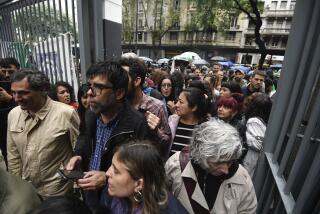Brazilian Unions Fail in Bid to Shut Down Nation to Protest Economic Policies of Sarney
- Share via
RIO DE JANEIRO — The Brazilian labor movement tried but failed Friday to shut down the country for a day with the first general strike since the armed forces gave up power in 1985.
The walkout, called to protest the economic policies of President Jose Sarney, shut down industry, commerce and public transportation in a few cities, but most workers ignored the strike call.
“It’s a political strike,” said a fare collector working Friday morning on a Rio de Janeiro bus. “When the strike is for increasing our salaries, then we will go out.”
Some independent estimates put the stoppage at 30% of the national labor force.
Impact Spotty
Flavio Pachalski, a labor federation spokesman, said the result was “a victory” but admitted that the impact was spotty.
“The strike affected all states in proportions that varied between 10% and 70% of the working population,” Pachalski said in a telephone interview.
Plinio Sarte, a Labor Ministry official, estimated that less than 10% of the country’s work stopped. Nevertheless, Sarte acknowledged that the strike had largely shut down Sao Paulo’s automotive industrial zone, the Port of Santos, the northeastern city of Salvador and “a great part” of the southern city of Porto Alegre. By telephone from Brasilia, the capital, Sarte said that government work there was not disrupted. “The ministries are all functioning. It’s normal,” he said.
In Rio de Janeiro, as in many other cities, the main impact of the strike was on public transportation. About half of Rio’s buses did not circulate, and subway trains did not roll.
Rio Buses Stoned
Radio reports said that eight buses in Rio were stoned by strike supporters early Friday, but few other violent incidents were reported around the country. Police in several cities detained dozens of persons for strike-related activities. Most were released before the end of the day.
The strike was called by the country’s main labor organizations to protest a series of price increases and other economic measures ordered by President Sarney in November. Price increases included 60% for gasoline and alcohol fuel, 35% for postage and telephone services, and up to 60% for electricity.
Most prices and wages had been frozen since the end of February under a program aimed at halting runaway inflation. No wage increases are to be granted until the post-February rate of inflation reaches 20%, as measured by an official cost-of-living index.
The government altered its method for calculating the official index, and unions complain that the move was aimed at presenting an artificially low inflation rate to postpone the wage-increase “trigger.”
Earlier Protest
Thousands of workers in Brasilia demonstrated against the new measures Nov. 27, burning official vehicles and sacking some stores. That demonstration was sponsored by the country’s two largest labor confederations, although they denied promoting any violence.
The same two confederations were the main sponsors of Friday’s strike. They said an additional reason for the strike was to protest “the bloodletting caused by the foreign debt.”
Brazil pays nearly $1 billion a month to service its $105-billion foreign debt. Many Brazilian economists, politicians and labor leaders advocate a moratorium on the debt payments.
More to Read
Sign up for Essential California
The most important California stories and recommendations in your inbox every morning.
You may occasionally receive promotional content from the Los Angeles Times.










